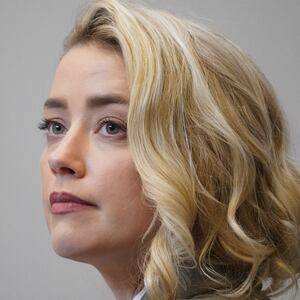After Amber Heard’s defense team rested their case on Tuesday, Johnny Depp’s lawyers opened the last round of testimony in the sprawling defamation trial between the former couple with a rebuttal of the argument that the actor’s former attorney and Twitter trolls sabotaged Heard’s acting career.
A movie executive who worked with Heard on the hit superhero film Aquaman, as well as expert witnesses for Depp, took aim at Heard’s own final witness from Monday: a movie industry consultant named Kathryn Arnold. Arnold had estimated Heard’s probable losses at $45-$50 million over five years starting around 2018 based on her career trajectory before her conflicts with Depp metastasized in court and online.
First up was Walter Hamada, president of DC Films, the movie wing of the superhero comics imprint behind the $1 billion-grossing Aquaman, which featured Heard opposite Jason Momoa in the title role. Testifying in a pre-recorded video, Hamada reiterated the Depp team’s argument that screen chemistry with Momoa, not negative publicity surrounding her breakup, was responsible for Heard’s reduced presence in the Aquaman sequel due in March of 2023.
“The reality is, it’s not uncommon on movies for two leads to not have chemistry,” Hamada said under questioning by Heard attorney Elaine Bredehoft. He said chemistry could be “fabricated” in post-production through editing and on-screen music, adding, “If you watch the movie, they look like they had great chemistry. But I just know through the course of the post-production that it took a lot of effort to get there.”
Hamada said the issue of chemistry—which he summarized as, “What makes a movie star a movie star? you know it when you see it.”—came up in conversations that included Momoa and Aquaman producer Peter Safran.
Richard Marks, an entertainment contracts lawyer who had already testified for Depp, scoffed on Tuesday at Arnold’s claim of pay expertise. Unlike him—a lawyer “in the trenches” negotiating deals for actors including Chris Pratt and Paul Rudd—she had no similar experience, he claimed.
Marks added, of Arnold’s estimates: “They’re not worth the paper they’re not written on.”
He also disputed that Heard was due for an ever bigger career breakout, and bigger paydays, after the December 2018 release of Aquaman. For the next 16 months, before one-time Depp lawyer Adam Waldman began calling Heard’s allegations of domestic violence bogus and even a “hoax,” her career was already plateauing, he argued.
“The ‘Star Is Born’ phenomenon didn’t happen,” Marks said.
Depp is suing Heard for $50 million, claiming she defamed him even without naming him in a 2018 Washington Post op-ed identifying herself as a victim of domestic violence. Heard is counter-suing for $100 million, claiming Depp and his former lawyer, Waldman, defamed her by labeling her allegations a “hoax.” Each has accused the other of violent abuses, from a claim by Depp that Heard threw a bottle that severed his finger to allegations from Heard that he struck her repeatedly and sexually assaulted her with a liquor bottle.
On Tuesday, Judge Penney Azcarate rejected a motion by Depp’s lawyers to throw out Heard’s counterclaim.
Using the roles, paydays, endorsements, and career trajectories of actors including Jason Momoa, Ana de Armas, Gal Gadot, Chris Pine, and Zendaya, Arnold had previously argued, “It’s very likely that Ms. Heard should have earned between $45 and $50 million over that time period.”
But Michael Spindler, an accountant who previously testified for Depp, said he learned from reviewing Heard’s 2013-2019 taxes that she earned $10 million in that time period, and cast doubt on Arnold’s projections because she used comparisons to other actors instead of Heard’s actual income history.
Another returning Depp witness, intellectual property and media consultant Douglas Bania, said on Tuesday that his own analysis of anti-Heard hashtagged tweets showed “no correlation” between Waldman’s “hoax” comments to news outlets in 2020-2021 and spikes in anti-Heard social media.
Bania claimed that just 751 hashtagged tweets—or 0.06 percent of some 1.2 million in the key time period in question—repeated or derived from Waldman’s “hoax” language. Therefore, he argued, there was no basis for the contention that they damaged Heard economically.
Bania also sought to turn Arnold’s actor comparisons against her by looking at their respective Q Scores, an accepted movie industry measurement of actor familiarity and appeal.
He showed jurors a graphic he made of Heard’s positive and negative Q scores from winter 2019—after Aquaman and before the alleged defamation. They were portrayed alongside those of Momoa, de Armos, Gadot, Pine and Zendaya. Heard’s positives were the lowest of the group and her negatives were the highest, he said.







